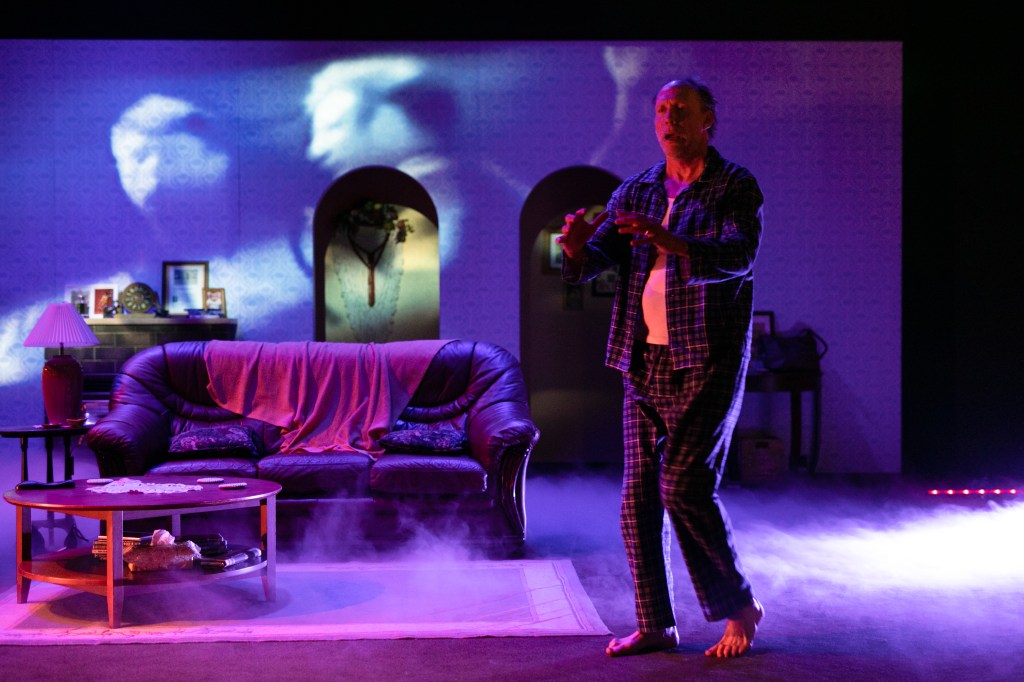Barracking for the Umpire, by Andrea Gibbs, was commissioned and presented by Black Swan Theatre Company of Western Australia and directed by Black Swan’s Artistic Director, Clare Watson. Delighted audiences have warmly embraced the story of an Australian Rules Football family in the town of Donnybrook in south-west WA.
Gibbs’ debut play is an exploration of Australian football culture, touching on themes ranging from gay men in football and women playing football to the interpersonal dynamics of a footy family and, most poignantly, the physical damage caused to men who play the game. As one of the characters comments, ‘this is the hurt game’ after all. Gibbs skims across multiple themes creating characters through the use of ocker humour and colloquial language to draw attention to systemic issues in the sport.
The title offers a glimpse into Gibbs’ position on taking sides and her writing uses humour to effectively highlight and illuminate, officiating without judgement.
Barracking for the Umpire tells the story of retired footballer, Doug Williams, who is played with nuance and sensitivity by Steve Le Marquand. Doug is being honoured with a Lifetime Achievement award by the Donnybrook Football Club and his wife Delveen (Pippa Grandison) couldn’t be prouder.
Their three adult children are returning to the family home for the celebration – Ben (Ian Wilkes) himself a rising footy star, his sister Mena (Ebony McGuire) an enthusiastic sports journalist and Charaine (Jo Morris), who lives in Donnybrook and has just broken up with her football-mad boyfriend, Tom (Michael Abercromby). Joel Jackson as the ‘Coach’ who haunts Doug’s memories enables a glimpse into toxic football behaviours that continue to impact Doug’s life in retirement.
The use of humour is a strength of the writing and audiences have responded with laughter and genuine enthusiasm. Some jokes are quintessentially Aussie, and bantering between characters is at times rapid-fire or exaggerated: think toilet seat on a crate for camping. In one instance, Mena suggests to her father that within football culture everyone should have a chance for glory – including women. Her father’s pithy response is ‘they’ve got netball’. The comedy ebbs and flows through a narrative about the impact of footy on a damaged ex-player, and on his family.
Sara Chirichilli’s set design remains fixed throughout the play. The Williams’ 1980s loungeroom is dominated by two lounge chairs and framed by a bar and doorways leading to bedrooms beyond audience view. Props are sourced directly from the town of Donnybrook, including mugs and a local Donnybrook newspaper.
The opening scene sees Doug Williams in pyjamas, lost in memories as he mimes playing footy in the loungeroom. Black and white footage of an old football game is projected on the back wall: a beautiful and touching moment. Successive scenes are overshadowed by the domestic set, at times a distraction as the action unfolds in locations as diverse as an airport or the local footy club.
The climax of the story highlights the effects of traumatic brain injury caused by playing football. Le Marquand captivates audiences as Doug struggles to speak and staggers to and from scenes. The character’s erratic deterioration due to repeated head injuries invites consideration of the cost of playing this sport. As the advancing condition of Chronic Traumatic Encephalopathy (CTE) is unveiled, the realities of Doug’s decline dawn on his distressed family who struggle with how to respond. Delveen’s final cry, ‘I haven’t heard the final siren yet’ is filled with helpless sadness.
Read: Exhibition review: TIME • RONE, Flinders Street Station
Barracking for the Umpire will resonate with people who love footy and possibly with those who embrace the nostalgia of belief that the Aussie family is essentially a footy family. As Delveen declares, ‘Footy’s a religion’ and Gibbs’ writing venerates footy culture with familiarity and affection. Her skill in lightly touching on complex issues through humorous dialogue draws audiences into the heart of the family’s distinctive football culture. Although referencing cultural stereotypes can often perpetuate them, Gibbs’ love of the game surfaces to hold it all together with wit, inviting compassionate responses from audience members.
Barracking for the Umpire by Andrea Gibbs
Black Swan State Theatre Company of WA
Subiaco Arts Centre, Western Australia
Director: Clare Watson
Dramaturg: Polly Low
Set and Costume Designer: Sara Chirichilli
Lighting Designer: Lucy Birkinshaw
Composer & Sound Designer: Joe Paradise Lui
Video Designer: Michael Carmody
Stage Manager: Riley Billyeald
Assistant Stage Manager: Madeleine Young
Dresser: Anna Weir
Cast: Michael Abercromby, Pippa Grandison, Joel Jackson, Steve Le Marquand, Ebony McGuire, Jo Morris, Ian Wilkes
Barracking for the Umpire was performed from 7-23 October 2022.





